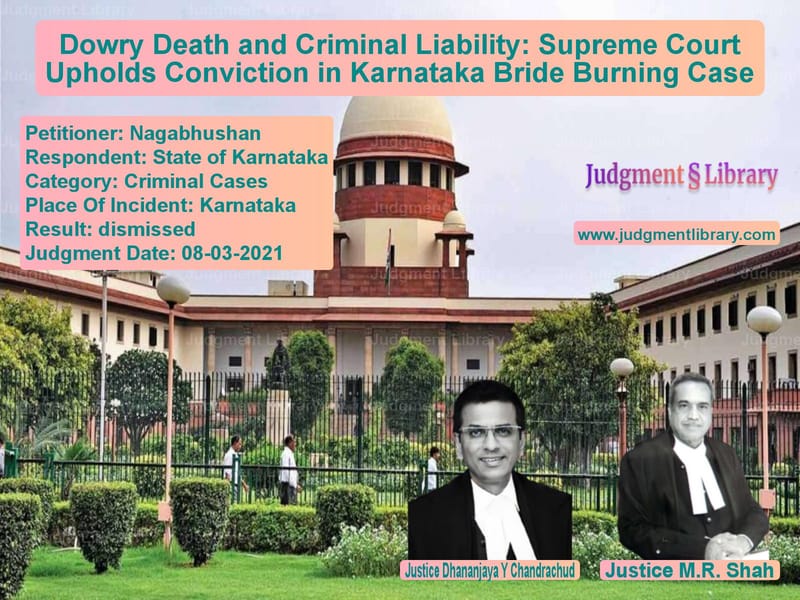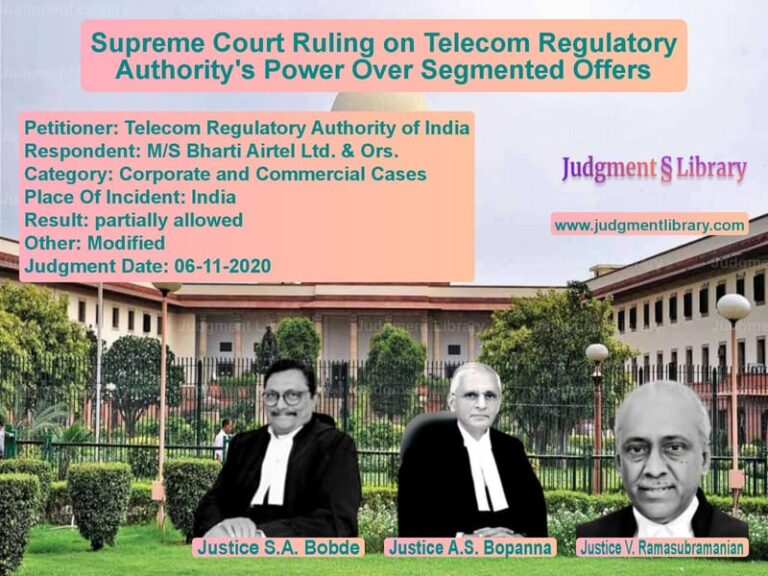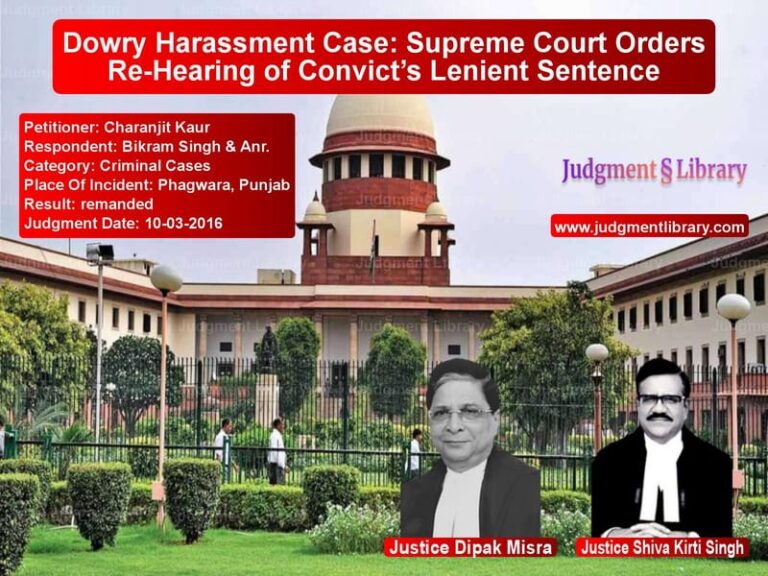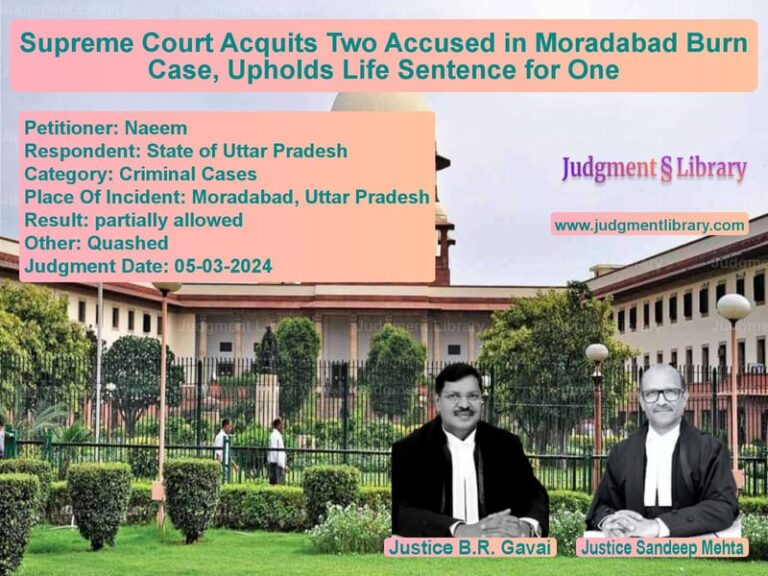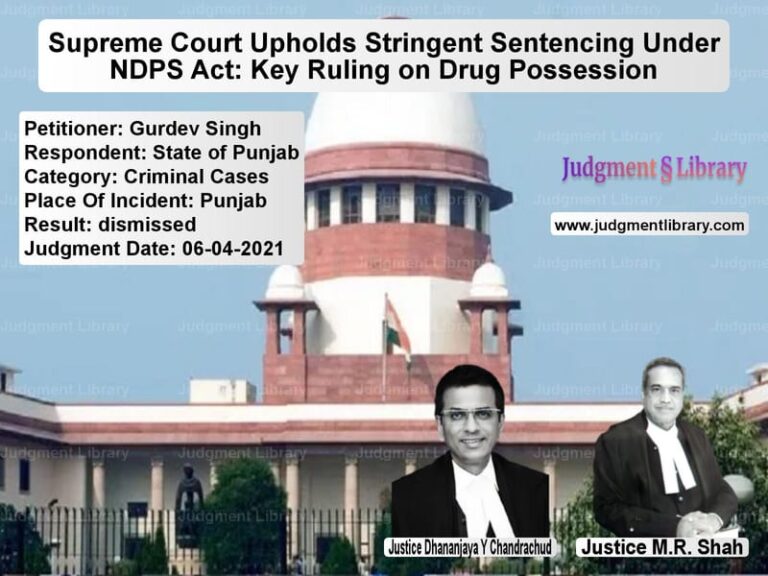Dowry Death and Criminal Liability: Supreme Court Upholds Conviction in Karnataka Bride Burning Case
The case of Nagabhushan vs. State of Karnataka revolves around the tragic death of Rekha, who was set ablaze by her husband due to a dowry dispute. The Supreme Court was called upon to decide whether the reversal of acquittal by the High Court was justified in convicting the appellant for offences under Sections 498A and 302 of the Indian Penal Code (IPC).
Background of the Case
The appellant, Nagabhushan, married Rekha nine years prior to the incident. According to the prosecution, Rekha was subjected to continuous mental cruelty and dowry demands from the accused and his family. Despite mediation efforts, Rekha’s parents (PW3 & PW4) had to pay Rs. 10,000 and Rs. 20,000 on two occasions to satisfy dowry demands.
On June 24, 2010, at around 9 PM, a quarrel broke out between the accused and Rekha at their matrimonial home. In a fit of rage, the appellant poured kerosene on Rekha and set her on fire. She was rushed to the hospital with severe burns. On June 25, 2010, her first statement (Exhibit D2) was recorded by the police, wherein she stated that the burns were accidental. However, on June 27, 2010, another statement (Exhibit P5) was recorded, in which she accused her husband of setting her on fire.
The trial court acquitted the accused, finding contradictions between the two dying declarations. The Karnataka High Court, however, overturned the acquittal and convicted the appellant, leading to the present appeal before the Supreme Court.
Key Issues Before the Supreme Court
The Supreme Court analyzed the case based on the following questions:
- Whether the High Court was justified in reversing the acquittal granted by the trial court?
- Whether the dying declaration (Exhibit P5) was reliable and sufficient for conviction?
- Whether the contradictions between the two dying declarations could provide the accused with the benefit of the doubt?
Arguments of the Parties
Petitioner’s Arguments (Nagabhushan, the Accused):
- The trial court had correctly acquitted him after finding contradictions in the two dying declarations.
- The first dying declaration (Exhibit D2), recorded immediately after the incident, should be given more weight as it stated the burns were accidental.
- The second dying declaration (Exhibit P5) was recorded in the presence of Rekha’s parents, making it susceptible to external influence.
- There was no conclusive proof that he had poured kerosene on his wife; rather, he had tried to save her.
The Supreme Court noted the appellant’s argument: “Cancelling the entire recruitment process without attempting to segregate the tainted candidates is arbitrary and unfair.”
Respondent’s Arguments (State of Karnataka):
- The second dying declaration (Exhibit P5) was consistent and clearly established that the accused had set Rekha on fire.
- The injuries sustained by Rekha, particularly on her face, chest, and back, were inconsistent with the defense’s claim that it was an accident.
- The first dying declaration was made under duress, as the accused had threatened Rekha that he would harm their children.
- The trial court erred in not giving due weight to Exhibit P5, which was corroborated by other evidence.
Supreme Court’s Analysis
1. Reliability of the Second Dying Declaration
The Supreme Court ruled that the second dying declaration (Exhibit P5) was reliable and could be the basis for conviction. The Court held:
- “The High Court has given cogent reasons while believing dying declaration (Exhibit P5) and has also considered in detail what is stated in the later dying declaration, vis-à-vis, the medical evidence and the injuries sustained by the deceased.”
- “When multiple dying declarations exist, the Court must independently evaluate each declaration to determine which reflects the true state of affairs.”
2. Legal Principles on Contradictory Dying Declarations
The Court referred to previous judgments where multiple dying declarations existed:
- Kashmira Devi vs. State of Uttarakhand (2020): Each dying declaration must be considered independently.
- Ashabai vs. State of Maharashtra (2013): The Court must determine which dying declaration is supported by medical and circumstantial evidence.
The Supreme Court held that Exhibit P5 was consistent with medical findings and was not contradicted by other evidence.
3. Role of Section 300 IPC – ‘Fourthly’ Clause
The Court found that the accused had intentionally poured kerosene and set his wife on fire, making it a clear case under Section 300 IPC. The Court stated:
- “The act of the accused pouring kerosene on the deceased and setting her ablaze is so imminently dangerous that it, in all probability, would cause death.”
- “Even if the accused later tried to save the deceased, it would not mitigate the offense under Section 302 IPC.”
4. Public Policy on Bride Burning and Dowry Deaths
The Supreme Court emphasized that courts must adopt a strict approach in cases of dowry deaths and bride burning. The Court observed:
- “Crimes against women disrupt the social fabric and call for harsh punishment.”
- “In cases of bride burning, courts must not show leniency but instead reinforce deterrence.”
Final Judgment
The Supreme Court upheld the High Court’s conviction of the accused under Sections 498A and 302 IPC. The key findings were:
- The trial court erred in acquitting the accused by relying on the first dying declaration.
- The second dying declaration (Exhibit P5) was corroborated by medical evidence and was reliable.
- The accused’s act was intentional, fulfilling the requirements under Section 300 IPC.
- Dowry-related offenses require a strict approach from courts.
This ruling reinforces the principle that courts must take a strong stance against dowry deaths and bride burning, ensuring justice for victims of domestic violence.
Petitioner Name: Nagabhushan.Respondent Name: State of Karnataka.Judgment By: Justice Dhananjaya Y Chandrachud, Justice M.R. Shah.Place Of Incident: Karnataka.Judgment Date: 08-03-2021.
Don’t miss out on the full details! Download the complete judgment in PDF format below and gain valuable insights instantly!
Download Judgment: nagabhushan-vs-state-of-karnataka-supreme-court-of-india-judgment-dated-08-03-2021.pdf
Directly Download Judgment: Directly download this Judgment
See all petitions in Murder Cases
See all petitions in Dowry Cases
See all petitions in Domestic Violence
See all petitions in Judgment by Dhananjaya Y Chandrachud
See all petitions in Judgment by Mukeshkumar Rasikbhai Shah
See all petitions in dismissed
See all petitions in supreme court of India judgments March 2021
See all petitions in 2021 judgments
See all posts in Criminal Cases Category
See all allowed petitions in Criminal Cases Category
See all Dismissed petitions in Criminal Cases Category
See all partially allowed petitions in Criminal Cases Category

